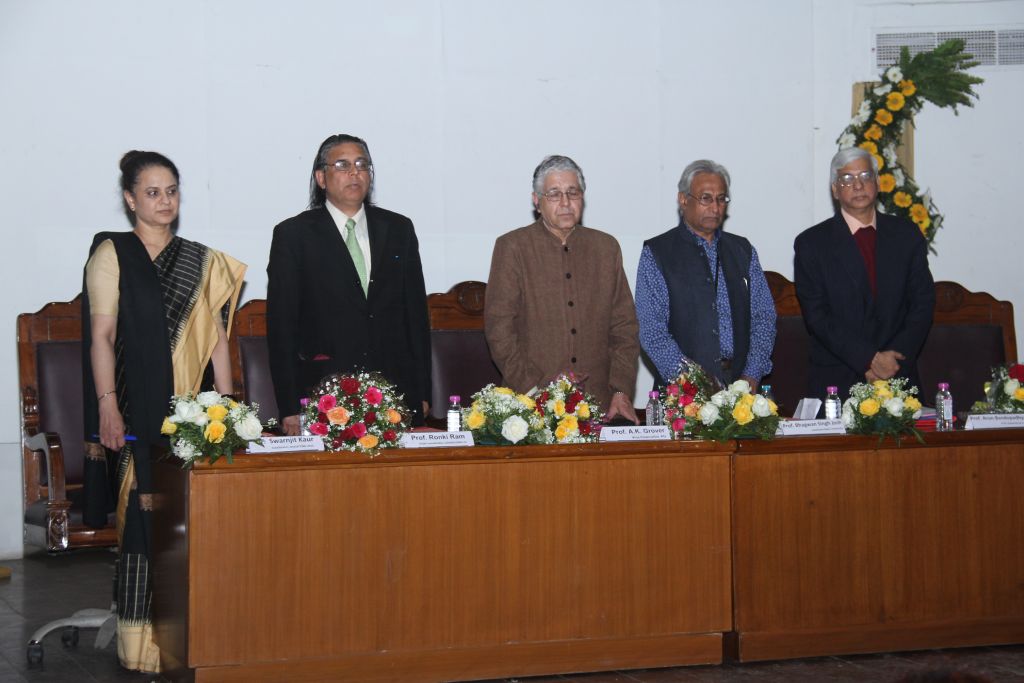Fifth Chandigarh Social Science Congress concludes at PU...
The prestigious conference was organised on the theme of 'Governance: Issues, Challenges and Strategies with reference to India'. Experts and academicians from different parts of the country discussed various governance related issues during the two daylong conference. The valedictory session began with the presentation by Professor of History at University of Calcutta, Prof. Arun Bandopadhyay. Prof Bandopadhyay, spoke about the community people’s rights. He focused on forest management program in Tamil Nadu and West Bengal, depicting the need for public participation by indigenous communities at grass-root level. Professor Bhagwan Singh Josh another distinguished scholar with multidisciplinary outlook from JNU stated that at this juncture the greatest challenge confronting governance is the backlash against modernity as exemplified by West Asia. He concluded by referring three key core ideas of Guru Nanak: truthfulness, contentment and knowledge as guiding principles of sustainable governance. PU Vice Chancellor, Professor Arun Kumar Grover appreciated the role of such conferences in bringing the academic community together on a common platform. He went on to point to the self-sustainable and development-oriented potential of the university. Earlier, the concluding day of the Congress began with the Panel Discussion on India’s Governance Strategies. Eminent scholars like Prof. Sucha Singh Gill, Prof. Rajivlochan, Prof. B.S. Ghuman, and Prof. Nishtha Jaswal from varied domains of knowledge deliberated on the theme. The session was chaired by former PU DUI Prof. B.S. Brar. Director, CRRID, Chandigarh, Prof. Sucha Singh Gill talked about asymmetrical distribution of information, complex institutionalized norms and behavior patterns interfering with allocation of resources. Prof. Nishtha Jaswal delivered referred to a few more terms that are used in the context of governance these days such as welfare and responsive governance in addition to the idea of good governance. Jaswal quoted from Kautilya’s Arthashastra which put the people’s needs above the king’s. Transparency, accountability and ethics in governance enhance its efficiency. She made references to many of the Supreme Court judgments that are in consonance with the principle of good governance. She also said that judicial accountability is very much a part of the governance mantra. Prof. Rajivlochan gave a very animated presentation on ‘Governance, History and Citizen’ emphasizing the fluctuating patterns of governance over a period of time. He also said that India was a land where citizens always considered state as the ultimate source of wielding power. Prof B.S. Ghuman spoke about public administration and citizen centric governance in India where vigilance assumes great importance. He delineated the reasons for failure on the policy front. He proposed the strategy of taking into consideration the ground reality at local levels. Prof. Brar in his presidential remarks emphasized that the problem with governance was the deliberate attempt at depoliticizing State. He referred to three different phases of governance. Coordinator CHASSCON 2015, Dr. Swarnjit Kaur gave her observations on the proceedings of the two day academic event. Prof Ronki Ram, the Chief Coordinator proposed the vote of thanks and requested Professor Anil Monga to take over as the Coordinator of the 2016 Social Science Congress. The conference came to a grand closure with ample and dynamic scope for future developments and debates. { Conferences/Seminar/Lecture} |
| Released on: February 21, 2015 Views: 2207 [ 31/01/2026 ] Source: CHASSCONG |
 Fifth Chandigarh Social Science Congress concluded at Panjab University (PU) here today.
Fifth Chandigarh Social Science Congress concluded at Panjab University (PU) here today.